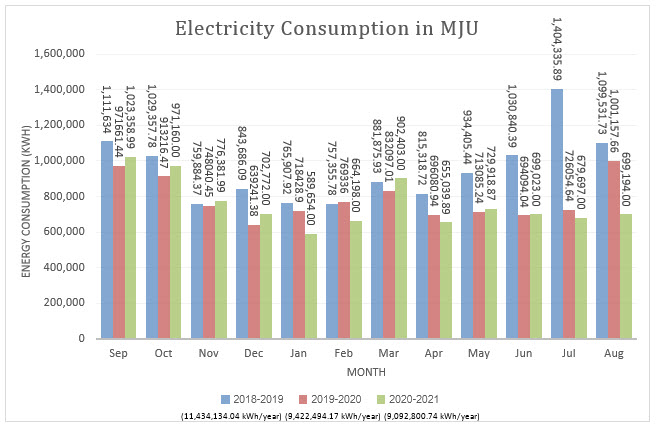Electricity usage per year (in kilo watt hour)

Electricity usage per year (in kilo watt hour)
Description:
Maejo University’s total annual electricity consumption is 9,092,800.74 kWh (from September 2020 to August 2021), which is approximately 3.5 percent less than the previous year (9,422,494.17 kWh). Maejo University opens trimester every year. The first term begins in early August and concludes in October. The second term embarks in late November and finishes in March and the Summer term, when the number of students is less than the first and second term, starts in mid-April and ends in June. Due to the COVID-19 pandemic, Although the majority of the educational activities this year has been conducted online following the ministry of public health’s measurements, all of the buildings in Maejo University has still opened to support educational activities such as laboratories and offices.
In comparison to 2019 and 2020, Figure 1 illustrates the electricity consumption in MJU in 2021. The electricity consumption from December 2020 to February 2021 was dropped down because of the announcement from Thailand’s ministry of public health that all educational activities were run online and work from home measure was activated due to COVID – 19 pandemics. The university reopened in March, with increased energy consumption in the university due to a fall in COVID – 19 cases in Thailand. However, due to the Delta variation, the COVID – 19 cases in Thailand, including Chiang Mai, have significantly grown from April to May. For this reason, the university established a field hospital (400 beds), at the university’s gymnasium, and a hospitech (hospital and university) with 150 beds at the international education and training center in April to support the COVID – 19 cases from nearby hospitals in Chiang Mai. The field hospital and hospital operated until the end of May, slightly increasing of energy consumption, clearing away the beds and renovating the buildings for educational activities in the incoming term. However, the COVID – 19 pandemic’s condition did not enhance, all of the educational activities such as teaching and meetings were performed online from July to August.
Furthermore, The Sport complex has been constructed since October 2020. For this reason, the power consumption in the campus has significantly increased, 5 – 10 percent approximately, all over this year.


